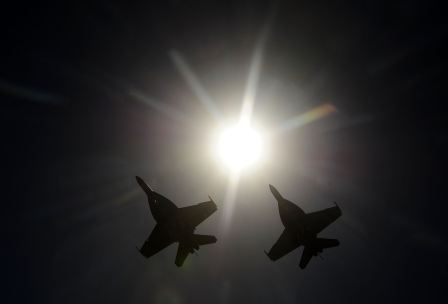
The UAE and Australia are united against the spread of Daesh terror that has thrown large parts of Iraq and Syria into chaos. With up to 600 Australian military personnel based in the UAE, Pablo Kang, the Australian Ambassador to the UAE and Qatar, says the UAE’s willingness to provide a strategic base for Australia’s armed forces is a demonstration of a shared ideology between the two countries.
“We’ve had, for a very long time now, a very close military and security relationship with the UAE. So Australians have been deployed to the country for a long time. The UAE was a major jump-off point for Australians into Afghanistan over the past decade or so.
"We have a very good bilateral Defence Cooperation Programme. There’s always been a good mutual exchange of capabilities and personnel,” he says.
“And it is, I think, an indication of how strong our overall bilateral relationship is in its many areas that both sides feel very comfortable about such a new and large deployment of personnel here, and that has been received so warmly.”
In an interview with American news network CNN last month, the UAE’s Minister of State for Foreign Affairs, Dr Anwar Gargash, said the UAE is “a full partner, politically [and] logistically” in the efforts to combat Daesh, adding that hosting Australian forces is a crucial move for the UAE. “Logistically, we are host to an Australian force that also plays a role here,” which he described as “an essential part of coalition building”.
Australian air power in the UAE comprises eight F/A18 Super Hornet jets, one E-7A Wedgetail Airborne Early Warning and Control aircraft, one KC-30A multi-role aerial tanker, a C-17 Globemaster and a C130 Hercules transport aircraft, providing airlift assistance with transport of military equipment, arms and munitions to Iraqi forces.
Kang says that Australia recognises that the Daesh threat is not just a crisis for Iraq and Syria, but that the threat compromises homeland security, and that working with the UAE is a proactive move to stamp out the possibility that Daesh fighters will target other countries.
“I can’t speak on behalf of the UAE, but clearly there is a concern here about the threat of terrorism in whatever form across a number of territories.”
Nuclear ambition
Aside from a shared ideology on defence and security matters, earlier this year the two countries ratified a potential multi-billion-dollar deal that will see Australia begin to export uranium to the UAE by 2016. Australia could sell up to 800 tonnes a year to the UAE for the under-construction Al Baraka plant in Abu Dhabi under the nuclear cooperation agreement brokered by Australian Trade Minister Andrew Robb. It will mark the first time Australia has sold uranium to a country in the Middle East.
Robb, who signed the deal with Shaikh Abdullah Bin Zayed Al Nahyan, Minister of Foreign Affairs, in Abu Dhabi in April, was quoted in The Australian as saying that the agreement would open a new long-term and valuable market for Australia.
“This Nuclear Cooperation Agreement has been secured because Australia is a reliable supplier of uranium and the UAE is a responsible user of nuclear energy for civilian purposes,” the Trade Minister said.
Under the agreement, Australia will supply uranium for the UAE’s civil nuclear power programme and cooperate in activities covering nuclear science and safeguards, security and safety.
Kang says the future supply of uranium to the UAE marks a significant development in the two countries’ trade relations, which currently rely on crude petroleum imports from the UAE and alumina exports from Australia. “Once the UAE’s civilian nuclear programme is in a ready state to start accepting the delivery of uranium, this will add another dimension to the diversification programme and will add a substantial boost.”
Trade growth
The influx of uranium would balance out the trade books, which currently sees the UAE exports to Australia at A$3.7 billion (about Dh11.88 billion), while Australian exports to the UAE stand at A$2.6 billion.
Last year, two-way trade stood at A$6.3 billion, a 24.7 per cent year-on-year increase, while Australian exports increased by 25.9 per cent. Kang attributes this increase to the fresh food segment. “From the figures we have, there’s been a particular increase in fresh food — meat and fruit — and I put this down to a couple of factors.
“The participation of Australian companies at big Gulf exhibitions and international food events has surged in the past couple of years. This year, we had over 120 companies at Gulf Food alone. And then there’s a lot of food retailers and distributors setting up their companies in the UAE — we’re seeing diversification in terms of food exports.”







